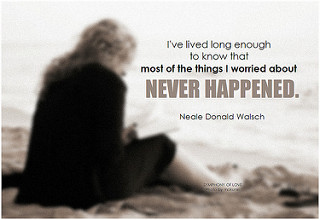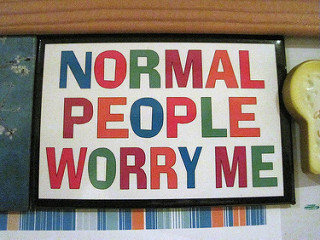This story is crap. I know it is.
I’ve been working at this for five years and I’m not getting anywhere. Am I just fooling myself?
I’m afraid I don’t really have any talent and I’m just wasting my time.
This novel has gotten too many bad reviews. I’ll never be able to publish another one.
Sound familiar?
These statements and more go through writers’ minds all the time. In fact, writers and worry go together like peaches and cream, or cookies and milk, or whatever your preferred pairing.
“Worrying has to be one of the essential parts of a writer’s DNA,” says literary agent Carly Watters. “There are so many things to be concerned about!”
The problem is that worry can be bad for your health, particularly if you do too much of it. But not all worry is bad. Here’s how to cope with it—and how to use it to help, rather than hinder—your writing career.
Study Links Worry with Creativity
It’s not surprising that many writers are worrywarts, at least according to a recent study. Researchers at King’s College in London put 125 participants through a number of tests, including measurements of depression, shyness, a tendency to worry, and verbal intelligence.
Results showed a link between those who admitted to worrying a lot and those who scored high in verbal intelligence. Dr. Adam Perkins, lead author of the study, also theorized that those who have the tendency to generate negative thoughts—and had high levels of activity in the part of the brain that governs our perception of threats—would also be likely to have a highly active imagination.
“Many of our greatest breakthroughs through the years were a result of worry,” he told Higher Perspectives. “Nuclear power? Worry over energy. Advanced weapons? Worry of invasion. Medical breakthroughs? Worry over illness and death.”
He added that cheerful people don’t brood over problems, and so may be at a disadvantage when it comes to problem solving compared to the neurotic worrywart. The researchers also noted that those who were good with words “find it easier to think in detail about past and future events—raising the odds of them being worriers.”
Writing for Today, Meghan Holohan says:
“If you’re a classic overthinker, you analyze everything that happens in your life. You mull over every decision until you’re exhausted. You even brood about your tendency to brood.”
Many writers would find this description familiar. In fact, other studies have found that artists and creative people tend to score higher on tests of neuroticism than those not in creative fields. Holohan goes on to explore the results of the study, including the idea that brooding leads to daydreaming, which can lead to creative discovery. But she adds that neuroticism is also associated with anxiety, fear, and frustration.
 Indeed, researchers found connections between high verbal depression and depression, as well.
Indeed, researchers found connections between high verbal depression and depression, as well.
This wasn’t the first study to find a link between worry and creativity. In 2014, researchers reported that worry was a sort of motivator for some neurotic people. When tested, participants who tended to be neurotic displayed more flexible thinking after recalling worrisome events. Those who weren’t neurotic performed better when recalling neutral events.
Keeping yourself in a state of worry for the sake of your creativity is not recommended, though. As mentioned, worrying too much can cause anxiety, depression, and other health issues that down the road, can actually hinder your creativity.
Chronic Worry Increases Risk of Health Problems
It may be of some comfort to know that our brains may be wired for worry. It tends to alleviate the self-recrimination a bit. But that doesn’t take away the fact that too much worry can be bad for us.
All that overthinking and creating negative scenarios in our heads can lead to a high level of stress and anxiety, which can feel quite miserable. You’ve probably heard that when we imagine something stressful, the body goes through the same process it might if we were actually facing that stressful experience. It releases stress hormones, tightens the muscles, and triggers a range of other physical responses to help us deal with the threat.
Over time, all those elevated hormones can wreak havoc on our health. More specifically, it increases risk of heart attacks, strokes, ulcers, digestive issues, insomnia, and depression. A late 1990s study, for instance, found that high levels of worry increased risk of coronary heart disease in older men.
In 2015, researchers reported that stress and worry could increase risk of liver disease, and a 2009 study found even more worrisome results: personality traits associated with chronic worrying increased risk of premature death. Fortunately, at least in this study, scientists found that the mortality risk was due to participants engaging in risky behaviors like smoking and drinking—things that are under our control.
A later 2012 study, though, found similar results—that even short periods of mild anxiety and depression can shave years off our lives. Researchers examined data from over 68,000 participants, and found that the greater the level of psychological distress, the more likely the person was to die of heart disease, cancer, or even external causes like auto accidents or injuries.
Those with the highest levels of distress were 41 percent more likely to die because of cancer. But even those with minor symptoms had a 20 percent increased risk of dying over a 10-year period.
We’ll learn more the more research we do, but it does seem that the more we worry, the more we risk our health.
So what’s a writer to do?
The Many Things Writers Worry About
Many writers couldn’t stop worrying if they tried. Like Watters said, there’s so much to worry about. In the early stages, you’re worried about whether you have talent, whether you’ll ever “make it” in this career, and whether it was meant for you in the first place. Later on, you worry about whether your story is going in the right direction, if you’re approaching publishing in the “right” way, and if you can even begin to figure out how to market.
Even established writers aren’t immune. As they say, you’re only as good as your most recent work, and bad reviews are a worry for everyone. The market is constantly changing, and who knows if your next story will find readers or not?
“Writers, after all,” says author and writing instructor James Scott Bell, “really have no cause to worry about anything, right? I mean, putting aside anxiety over whether they’ll ever get an agent, get published, sell enough to stay published, or if they do get published will they get stink bomb reviews; or wondering if they are real writers or only massive frauds, or if they are doing too little self-promotion, or too much; concerns over whether they’re putting undue strain on their marriages or other close relationships; and getting migraines wondering what the future of publishing will look like—discounting all that, writers really have no reason to worry at all.”
Among the “25 things writers worry about,” according to young adult author Kerri Maniscalco, are the possibilities that “my book sucks” and “I’m over-thinking again” and of course, “Is my writing good enough?”
 It seems to be just the way it is, as so many writers will tell you. Freelance writer Liz Lazzara says that writers worry about the empty page, about where to start and where to end, that no one will want our work, and that we will “live and die in a vacuum of literary poverty.” Most of all, she asserts, we worry that our work will never find the readers it was meant for.
It seems to be just the way it is, as so many writers will tell you. Freelance writer Liz Lazzara says that writers worry about the empty page, about where to start and where to end, that no one will want our work, and that we will “live and die in a vacuum of literary poverty.” Most of all, she asserts, we worry that our work will never find the readers it was meant for.
“But we worry most that the one person our writing was meant to reach will never find it, that we will not have touched them with the gentle caress of shared experience. We worry that the impact we leave will be in page impressions and ad revenue instead of tears and smiles and earnest nods of the head. We worry that our work will be completed, but that it will not matter because it never found its soulmate, the one person who will hold it tenderly with gratitude and love.”
Despite these and other worries, we continue to write, which of course means we continue to worry. So how can we manage our anxiety without letting it ruin our health and peace of mind?
10 Ways to Rob Worry of Its Destructive Power
To help counteract the worry that you go through, the most important thing is to make sure you schedule time in your day to relax—every day. Pencil in whatever works for you. That may be a nice long walk, lunch with friends, a hot bath, meditation, yoga, your regular exercise routine, art therapy, time with your pets, listening to an audio book on your commute home, etc.
In addition to that, here are ten other ways to get hold of writer’s worry—before it gets hold of you. As author Jill Jepson says:
“Worry and doubt are not only painful, they are deadly to a writing career.” She goes on to say that worry and doubt—especially about your own abilities—can “force you to abandon good work, and prevent you from sending your work out.”
1. Realize that worry is part of the job.
If you worry about whether or not you’re “good enough” or if your latest work is worth your time, realizing that most writers experience these feelings can help you relax.
According to Writer’s Digest Books editor Rachel Randall, best-selling author Harlan Coben was speaking to a crowd when he was asked if, with all his success, he still felt insecure about any part of his writing:
“He laughed and admitted that’s the writers stock in trade. Coben said he always gets to a point in a work-in-progress when he thinks, ‘This is terrible! I used to be so good. When did I lose it?’
“In fact, if you’re not insecure about your writing, Coben says, you’re either mailing in forgettable stuff or somebody else is writing for you.”
 2. Ask yourself: what’s the worst that can happen?
2. Ask yourself: what’s the worst that can happen?
You’ve probably played this game before. Imagine what the worst outcome is, and determine how you will deal with it. Once you have the answer, you’ll probably be able to relax.
If you’ve sent in a submission, for example, the worst result is they will reject you. Decide how you will handle it. Either you’ll send the manuscript back out, get some help from an editor, put the story in a drawer and move on to something else, or quit. Whatever your decision, you’ll be able to deal.
3. Realize that failure means you’re trying.
Many of us worry about failure. That we won’t get a publishing contract. That we’ll never become bestselling authors. That no one will like our books. But failing isn’t a bad thing. It’s a sign that we’ve tried, that we’ve put ourselves out there. And it’s one of the best teachers we can have.
Don’t fall into the trap of believing that failure means you don’t have talent. Famous writers like Herman Melville, F. Scott Fitzgerald, Margaret Atwood, and John le Carre all experienced repeated failures in their lives.
 4. Choose to ignore it.
4. Choose to ignore it.
It can be difficult to ignore our worries, but if you can do it, your writing may benefit. If you find, for example, that your worries creep in while you’re working on your next novel, you can choose to either put those worries aside and keep working, or indulge those negative thoughts. The problem is, if you pay attention to the worries, they will likely grow.
The thing with worries is they mostly focus on what “could” happen in the future, and none of us can predict that. You can do one of two things: either bring your attention back to the present moment and focus on your story, or write the worry down and set it aside for a later time.
Writing down the worry can be especially effective. Sometimes, what we’re worrying about may require a bit more thought. If you’re worried your story lacks editing, for example, and this worry is plaguing you in the days leading up to your self-publishing launch, it might be wise to examine the worry and potentially consider hiring a book editor. Just don’t allow the worry to interfere with your writing time.
5. Take action.
Worry is a completely mental activity, and is often the result of ruminating over something too much. The answer can be as simple as taking action. Go for a walk, engage in some exercise, get some work done around the house or office, or focus on a task you’re doing for someone else. All of these activities can get your mind off your worries and onto something tangible that you can do, which can give all that stress an outlet—great for your health.
Engaging in some sort of creative activity is also a great way to dispel your worries and potentially open up your mind to solutions. A writer may find solace in playing a musical instrument, crocheting or knitting, painting, woodworking, or a number of other artistic pursuits that don’t involve the same brain pathways as writing does. All of these activities can channel overthinking into something healthier.
 6. Accept that you’re a worrier.
6. Accept that you’re a worrier.
Though these tips may help you to worry less, or to turn your worry into something less stressful, I don’t suggest that you try to stop worrying completely. Those of us programmed to worry are probably not going to be able to stop anytime soon, nor would we want to.
A 2005 study found that when participants tried to suppress their worries, they actually ended up being more distressed by their worrisome thoughts. Those told to practice quiet acceptance of their worries, on the other hand, had lower levels of depression and anxiety.
Next time your worries pop up in your mind, practice accepting them calmly, and then remind yourself that most of what you worry about never happens, and that worrying has little benefit unless you can take action to reduce your worry. Above all, send yourself loving and accepting thoughts.
7. Write about it.
May seem obvious, but writers can find relief writing about their worries. It’s a natural go-to for us, and an easy way to dispel the stress that can build up in our bodies.
A 2011 study, for instance, found that writing about worries before a test helped students perform better on the test. Other studies have found that journaling can be an effective way to relieve worry and reduce stress, and that expressive writing reduces worry and depression.
So the next time those worries come up, take a break and journal about them. Try just ten minutes of free writing. Get it all out on paper, then take a deep breath and get back to your creative work.
8. Identify your “triggers.”
If you’re like most writers, you may have certain triggers that start the worrying cycle. Some possibilities include:
- When you’re struggling with your work in progress, and aren’t sure how to move forward.
- When you read about the success of another writer.
- When you get negative feedback from a critique, contest, online reader, editor, or agent.
- When your book is about to launch.
- When you’ve sent out a submission (or more than one).
- When you go to a conference or other writers event and it seems everyone else is farther along than you are.
You may have other triggers that start you worrying about a number of things, including your own talent, your work, or your future. Try to take note of when these worries are most likely to surface in your mind. Realize that patterns that may be engraved there in your neurons.
Once you’ve identified these triggers, you can start to address them differently. Rather than letting your thoughts run amok, replace your negative thoughts with supportive, reassuring ones. For example: “I’ve struggled with my work before and found solutions. I’m sure I’ll do it again.” Or: “Everyone succeeds at his or her own rate. I’m on my own path and there’s no need to compare it with anyone else’s.”
 9. Embrace uncertainty.
9. Embrace uncertainty.
We humans like to know what’s coming up. We like to be prepared. Those of us who tend to be a bit neurotic are even more this way. We doubt our ability to act on the fly, and would rather rehearse what we need to do to deal with difficult situations.
But a writer’s career, just like anyone else’s, is never certain. None of us are guaranteed an easy, smooth climb to the bestseller’s list. And sometimes it has nothing to do with talent. Some things are simply beyond our control.
Accepting that, and embracing what you enjoy about the writer’s life, can help you find some relief from worry. All you can really control is your own writing practice, and what you do to encourage your own learning along the way. What others think of your writing, reader reviews, sales, and a lot of the rest of it are largely beyond you (besides the marketing activities you may engage in).
Realize that your future is uncertain, but meanwhile, you can enjoy writing as long as you like.
10. Share your worry with other writers.
Writers need each other. When we share our feelings, we realize that we’re not alone in what we experience, and that can be a great comfort. Even if all we do is share how useless worry is, it can help.
“Do you sit down to write and start thinking of all the other books that are so much better than yours?” writes fantasy author Ilana Waters. “Or which ones have a great commercial ‘hook,’ and what were you thinking starting your WIP anyway? Or do you read an article on promoting that advocates a totally different approach from what you’ve been doing? All of a sudden you’re like, ‘Should I have been doing this all along instead?’ (cue the headsmack) What’s the number one thing you worry about as a writer? What stops you from putting pen to paper, and how do you deal with that?”
Indeed. How do you?
What do you worry about as a writer? Please share in the comments.
Sources
Adam M. Perkins, et al., “Thinking too much: self-generated thought as the engine of neuroticism,” Trends in Cognitive Sciences, September 2015; 19(9):492-498; http://www.cell.com/trends/cognitive-sciences/abstract/S1364-6613%2815%2900154-0.
Angela K.-y. Leung, et al., “The Role of Instrumental Emotion Regulation in the Emotions-Creativity Link: How Worries Render Individuals with High Neuroticism More Creative,” Emotion, 2014; http://dx.doi.org/10.1037/a0036965 , http://www.ntu.edu.sg/home/linqiu/publications/emotionandcreativity.pdf.
Laura D. Kubzansky, et al., “Is Worry Bad for Your Heart?” Circulation, 1997; 95: 818-824, http://circ.ahajournals.org/content/95/4/818.full.
Dan Sung, “Depression and Stress Linked to Liver Disease,” May 20, 2015, http://www.independent.co.uk/news/science/depression-and-stress-linked-to-liver-disease-10262684.html.
Amy Patterson Neubert, “Study: personality traits associated with stress and worry can be hazardous to your health,” Purdue University, August 18, 2009; http://www.purdue.edu/uns/x/2009b/090818MroczekNeurotic.html.
Tom C. Russ, et al., “Association between psychological distress and worry: individual participant pooled analysis of 10 prospective cohort studies,” BMJ 2012; 345:e4933, http://www.bmj.com/content/345/bmj.e4933.
Ryan Jaslow, “Mild cases of anxiety, depression, may lead to an early death,” CBS News, August 1, 2012 , http://www.cbsnews.com/news/mild-cases-of-anxiety-depression-may-lead-to-an-early-death/.
Brooke A. Marcks, Douglas W. Woods, “A comparison of thought suppression to an acceptance-based technique in the management of personal intrusive thoughts: a controlled evaluation,” Behavior Research and Therapy, April 2005; 43(4):433-445, http://www.sciencedirect.com/science/article/pii/S0005796704000853.
William Harms, “Writing about worries eases anxiety and improves test performance,” University of Chicago News, January 13, 2011, http://news.uchicago.edu/article/2011/01/13/writing-about-worries-eases-anxiety-and-improves-test-performance.



I have these earrings. One says Don’t worry, the other be happy. I’m sending them to you. Spot on story.